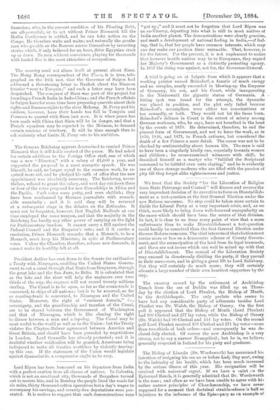The German Reichstag appears determined to remind Prince Bismarck that
it still holds control of the purse. He had asked for certain additions to the Foreign Office staff, one of which was a new "Director," with a salary of £1,000 a year, and supported the proposal in a most energetic speech. He was himself, he said, no longer equal to the excessive work, he re- quired more aid, and he pledged his oath of office that the new appointment was absolutely necessary. The Reichstag, never- theless, refused to grant the salary, and next day cut down three or four of the votes proposed for new Consulships in Africa and the Pacific. Such votes seem petty, and even childish ; they have been condemned by German journalists with remark- able unanimity ; and it is said they will be reversed at a subsequent stage in the debates on the Estimates. It must not be forgotten, however, that English Radicals at one time employed the same weapon, and that the majority in the Reichstag has hardly any other power of carrying on the fight for Parliamentary freedom. It cannot carry a Bill against the Federal Council and the Emperor's veto ; and if it carries a resolution, Prince Bismarck remarks that a Monarch, to be a Monarch, must keep his Ministers, in spite of Parliamentary votes. Unless the Chamber, therefore, refuses new demands, it cannot make its hostility felt at all.






































 Previous page
Previous page